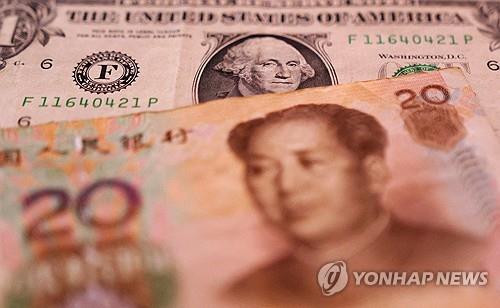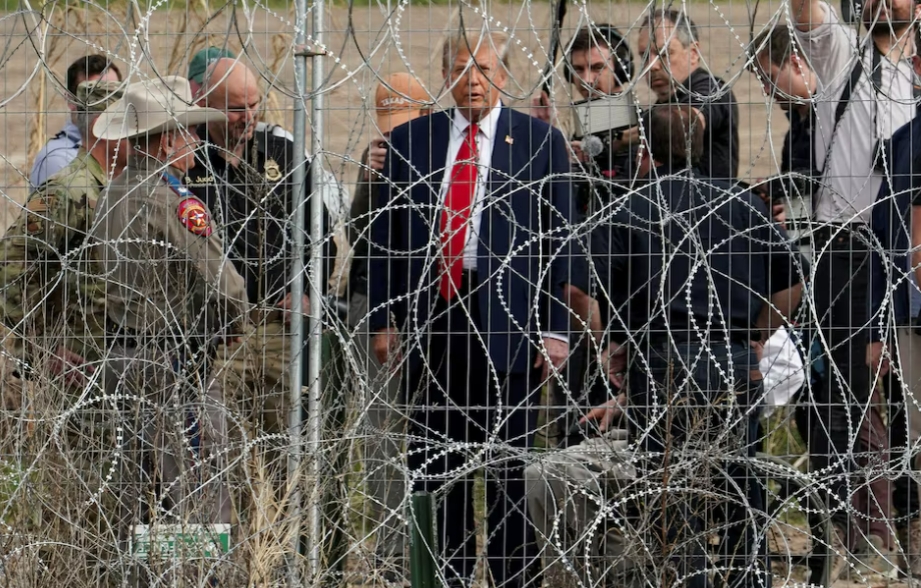Concerns about capital outflow and inflation due to weak domestic currency
<img src="https://img7.yna.co.kr/etc/inner/KR/2024/11/21/AKR20241121070700009_01_i_P4.jpg" alt="Yuan and dollar banknotes”/>
Yuan and dollar banknotes
[로이터 연합뉴스 자료사진]
(Seoul = Yonhap News) Reporter Cha Byeong-seop = There are concerns that Asian countries will face not only tariffs but also a strong dollar with former U.S. President Donald Trump’s return to power.
The US daily Wall Street Journal (WSJ) mentioned the issue of a strong dollar on the 20th (local time), saying that if a trade war is triggered after President-elect Trump takes office, it could cause many headaches for Asian countries.
President-elect Trump has pledged a 20% universal tariff on all imported goods, tax cuts, and deportation of illegal immigrants, and if these become reality, inflation is likely to worsen.
advertisement
This will act as a burden on the US base interest rate cut, leading to the possibility that high interest rates will prolong. Accordingly, interest rates on U.S. Treasury bonds have recently risen and the value of the dollar is also showing strength.
The dollar index, which represents the value of the dollar against six major currencies, including the euro and yen, has risen by about 3% since the 5th. The won/dollar exchange rate is hovering around the 1,400 won level, and the value of major Asian currencies such as the Japanese yen and Chinese yuan are also weak against the dollar.
If the currency value of each Asian country falls, export competitiveness increases, which can absorb some of the shock caused by tariffs, but at the same time, the risk of capital outflow also increases. During the strong dollar period following the 2008 financial crisis, stock markets in Asia, excluding Japan, fell by an average of 13%.
Capital outflow may cause difficulties in countries such as China, where the economy is struggling to recover due to the prolonged slump in the housing market.
During the 2018-2019 trade war during the first Trump administration, the value of the yuan fell about 10% against the dollar. This time, as President-elect Trump pledged to impose a 60% tariff on China, which is higher than before, the yuan will need to weaken further to offset this. is needed.
WSJ predicted that China will respond cautiously while watching the actual announcement of the US tariff policy, predicting that a certain degree of yuan weakening can be tolerated, but a sharp weakening will be prevented as there is a possibility of capital outflow.
He pointed out that although other Asian countries may be less concerned about capital outflow than China, inflation is likely to worsen due to rising import prices due to a weakening currency.
This could be a limiting factor in lowering base interest rates in Asian countries.
Investment bank Barclays recently revised its previous forecast that Indonesia would cut its base interest rate in November and December, and assessed that Korea and Taiwan’s rate cut path is becoming more difficult.
Unlike other countries, Japan is in the process of raising interest rates, and there is a possibility that the rate of increase will increase if the yen weakens.
WSJ added that since Asian countries have sufficient foreign exchange reserves, there is a possibility that they will intervene in the foreign exchange market to prevent a sharp decline in the value of their currencies, adding that Asian central banks may face a difficult and risky balancing situation.
Report via KakaoTalk okjebo
Unauthorized reproduction/redistribution, AI learning and use prohibited>
2024/11/21 11:40 Sent

**How might the combination of a strong dollar and potential renewed trade tensions with China and other Asian economies differentially impact export-oriented economies like Vietnam compared to those reliant on foreign investment like Indonesia?**
## Interview: Navigating Economic Turbulence – Trump’s Return and the Impact on Asia
**Guests:**
* **Dr. Emily Chen:** Professor of International Economics, specializing in Asian markets, at Georgetown University.
* **Mr. David Kim:** Senior Economist at the Institute of International Finance, focusing on global trade and currency markets.
**Interviewer:**
Welcome Dr. Chen and Mr. Kim. The Wall Street Journal recently highlighted concerns over a potential “strong dollar” scenario should Donald Trump return to power, raising questions about the impact on Asian economies. Let’s delve into these concerns.
**Section 1: Trade Wars and Tariffs - A Return to Uncertainty**
**Interviewer:** Let’s start with the potential for trade wars. How likely is it that Trump will impose the 20% universal tariff he discussed during his campaign, and what might be the immediate repercussions for Asian economies?
**Dr. Chen:**
**Mr. Kim:**
**Interviewer:** The WSJ article mentions that a weakening currency alongside tariffs could, in fact,
benefit Asian exporters. Do you agree with this assessment? Could there be a silver lining for some Asian economies?
**Dr. Chen:**
**Mr. Kim:**
**Section 2: The Specter of Capital Flight and Currency Volatility**
**Interviewer:** Another spectre raised by the article is the possibility of capital outflow from Asian economies as a strong dollar becomes more attractive. How vulnerable are Asian economies to this risk, and what measures can they take to mitigate it?
**Dr. Chen:**
**Mr. Kim:**
**Interviewer:** You mentioned the role of foreign exchange reserves. How effective is this tool in preventing sharp currency depreciations, and are there any potential downsides to using it excessively?
**Dr. Chen:**
**Mr. Kim:**
**Section 3: Inflationary Pressures and Monetary Policy Tightening**
**Interviewer:** The article also points out that a weaker currency often leads to inflation. How might this impact individual Asian economies and their ability to manage interest rates?
**Dr. Chen:**
**Mr. Kim:**
**Interviewer:** Looking ahead, what are your main concerns regarding the economic outlook for Asia in the scenario of a strong dollar and potential trade tensions?
**Dr. Chen:**
**Mr. Kim:**
**Interviewer:** Thank you both for sharing your valuable insights. This complex situation certainly warrants continued discussion and analysis as events unfold.

